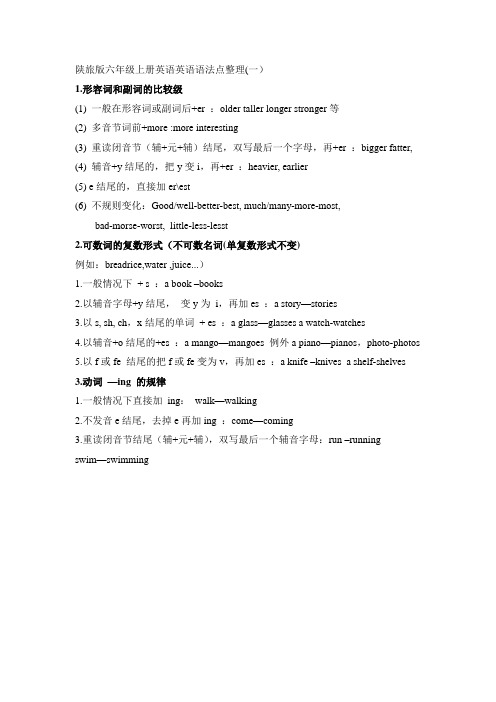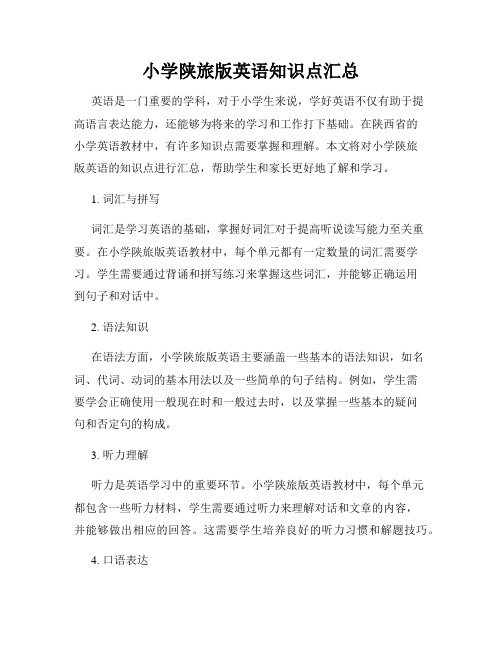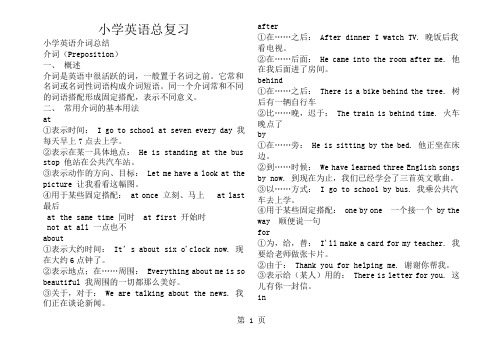【小学英语】陕旅版小学英语语法总复习
陕旅版六上英语英语语法点整理(一)

陕旅版六年级上册英语英语语法点整理(一)
1.形容词和副词的比较级
(1) 一般在形容词或副词后+er :older taller longer stronger等
(2) 多音节词前+more :more interesting
(3) 重读闭音节(辅+元+辅)结尾,双写最后一个字母,再+er :bigger fatter,
(4) 辅音+y结尾的,把y变i,再+er :heavier, earlier
(5) e结尾的,直接加er\est
(6) 不规则变化:Good/well-better-best, much/many-more-most,
bad-morse-worst, little-less-lesst
2.可数词的复数形式(不可数名词(单复数形式不变)
例如:breadrice,water ,juice...)
1.一般情况下+ s :a book –books
2.以辅音字母+y结尾,变y为i,再加es :a story—stories
3.以s, sh, ch,x结尾的单词+ es :a glass—glasses a watch-watches
4.以辅音+o结尾的+es :a mango—mangoes 例外a piano—pianos,photo-photos
5.以f或fe 结尾的把f或fe变为v,再加es :a knife –knives a shelf-shelves 3.动词—ing 的规律
1.一般情况下直接加ing:walk—walking
2.不发音e结尾,去掉e再加ing :come—coming
3.重读闭音节结尾(辅+元+辅),双写最后一个辅音字母:run –running swim—swimming。
陕旅版六年级英语(上册)总复习提纲

陕旅版六年级英语(上册)总复习提纲陕旅版六年级上册英语复习提纲⼀.重点句⼦句型Unit 11. -What are you doing, Wu Chen? - I’m having a rest.2. But it’s time to learn English.3. It doesn’t matter.4. Take out your English book, please.5. I’m afraid you can’t.6. I’ll play the violin right now.7. On Saturday morning, Li Shan always gets up at half past six.8. She plays it for an hour.9. You’ll have no time to have breakfast.10. Then she brushes her teeth and washes her face.Unit 21.You look healthy.2.I always eat healthy food and I like sports.3.--How often do you drink milk? -- I drink milk every day.4.My mom says it’s good for me.5.She goes to bed early and sleeps nine hours every night.6.She goes skating twice a week and goes boating in the park once a month.7.Kitty’s favorite sport is ping-pong.8.She does well in her study because she eats well, sleeps well and plays well.9.I don’t like fruits or vegetables.10.--How often does she play tennis? --She plays tennis twice a week. Unit 31.What’s the matter? = What’s wrong? = what’s up? (with you)2.Some more soup, dear?3.But I have no time. I have to clean my bike.4.Why not go in your dad’s car?5.We shouldn’t drive the car today.6.It’s time to do something for our earth.7.Why? Because today is World Car Free Day.8.We all live on the earth.9.There are a lot of trees, flowers, rivers and mountains on the earth.10.But sometimes we do bad things to it.11.We cut down too many trees and waste too much water.12.We have only one earth. We should care for it.13.We should do something to make the water and the air clean again. Unit 41.--What do you often do on weekends?-- I usually go to the park and fly a kite.2.Are you free next Saturday?3.Let’s go on a picnic at the foot of the mountains.4.Why not have the picnic in the park? Good idea.5.Shall we meet at the gate of the park?6.What shall we take?/When shall we meet?/Where shall we meet?7.We shall get to the park early and come back early.8.The children would like to go on a picnic at the foot of the mountains.9.Would you like some chicken? No, thanks.10.How about going to the Old People’s Home?11.I’d like an apple.12.Alice is taking the food out of the basket.13.I’m a little hungry.Unit 51.What a heavy rain.2.It was here just now./doc/0b4f117877eeaeaad1f34693daef5ef7bb0d120f.html st night, they were under your bed.4.It was in front of the house yesterday.5.I’m afraid it was lost. You have to walk to school today.6.Were you at this school thirty years ago? Yes, I was. /No, I wasn’t.7.Was there a library? Yes, there was./ No, there wasn’t.8.Were there any trees? Yes, there were. / No, there weren’t.9.But there weren't so many books in it.10.But the school was small at that time.Unit 61.What did you do last weekend? I did some housework.2.They were busy. My father had some work to do. He went away from home early in the morning.3.She was in the hospital. My grandma was ill and my mother looked after her there.4.She is better now.5.I went to see some friends and we had a football match.6.What show did you watch? I watched a show about a Shaanxi girl.7.What happened to her? When she was 8 years old, her mother was ill in bed. She did all the housework by herself.8.She looked after her mother for some years.9.And she did very well in her study.10.What a good girl!Unit 71.Did you go out to play last weekend? No, I didn’t.2.I stayed at home.3.I learned to cook and made a big cake by myself.4.I flew to Hainan with my family.5.I swam in the sea and played beach volleyball with my uncle and cousin.6.Sounds interesting. Did you eat any sea food?7.They went there by train and stayed in Beijing for three days.8.They took many photos there.9.On the first day,... The next day,... The las t day… 第⼀天……第⼆天……最后⼀天……10.They really had a good time.Unit 81.What do you think of our party? It was great.2.They acted it well.3.I think everyone had a good time.4.At seven o’clock, everything was ready.5.There were many colorful lights and balloons in it.6.At the beginning, all the students sang Happy New Year together.7.Then, Li Shan and Wu Chen acted a short play about a poor girl. It made many students cry.8.After that, Liu Zhaoyang told a joke. It was funny and made everyone laugh.9.Finally, the students played some games. Everyone was excited.10.It was really a great party.11.Class One had a New Year’s party on December 31st.⼆.语法回顾1. there be句型的⼀般过去时运⽤⼀般疑问句---Was/Were (+冠词) +名词... ?---Yes, there was/were. / No, there wasn’t / weren’t. 陈述句---There was/were +某⼈/某物+某地(+过去的时间)。
小学陕旅版英语知识点汇总

小学陕旅版英语知识点汇总英语是一门重要的学科,对于小学生来说,学好英语不仅有助于提高语言表达能力,还能够为将来的学习和工作打下基础。
在陕西省的小学英语教材中,有许多知识点需要掌握和理解。
本文将对小学陕旅版英语的知识点进行汇总,帮助学生和家长更好地了解和学习。
1. 词汇与拼写词汇是学习英语的基础,掌握好词汇对于提高听说读写能力至关重要。
在小学陕旅版英语教材中,每个单元都有一定数量的词汇需要学习。
学生需要通过背诵和拼写练习来掌握这些词汇,并能够正确运用到句子和对话中。
2. 语法知识在语法方面,小学陕旅版英语主要涵盖一些基本的语法知识,如名词、代词、动词的基本用法以及一些简单的句子结构。
例如,学生需要学会正确使用一般现在时和一般过去时,以及掌握一些基本的疑问句和否定句的构成。
3. 听力理解听力是英语学习中的重要环节。
小学陕旅版英语教材中,每个单元都包含一些听力材料,学生需要通过听力来理解对话和文章的内容,并能够做出相应的回答。
这需要学生培养良好的听力习惯和解题技巧。
4. 口语表达口语是英语学习的一个重要方面,学生需要通过口语练习来提高自己的口语表达能力。
在小学陕旅版英语课堂上,学生可以进行一些简单的对话练习,或者进行角色扮演,模仿真实的日常交流场景,锻炼口语表达的能力。
5. 阅读理解阅读训练是帮助学生提高阅读理解能力的重要方法。
小学陕旅版英语教材中,每个单元都包含一些阅读材料,学生需要通过阅读来理解文章的主题、细节和重点信息,并能够回答相关问题。
学生可以通过多读、多练的方式提高自己的阅读理解水平。
6. 写作能力写作是英语学习的重要组成部分,通过写作可以帮助学生巩固所学知识,并提高语言表达能力。
小学陕旅版英语教材中,学生需要进行一些简单的书面表达,如写作文、填写问卷等。
通过写作,学生可以练习语法知识、词汇运用和句子结构,提高自己的写作水平。
总结起来,小学陕旅版英语知识点汇总主要包括词汇与拼写、语法知识、听力理解、口语表达、阅读理解和写作能力。
陕旅版小学六年级英语总复习汇编 全套word精品文档39页

小学英语总复习小学英语介词总结介词(Preposition)一、概述介词是英语中很活跃的词,一般置于名词之前。
它常和名词或名词性词语构成介词短语。
同一个介词常和不同的词语搭配形成固定搭配,表示不同意义。
二、常用介词的基本用法at①表示时间: I go to school at seven every day 我每天早上7点去上学。
②表示在某一具体地点: He is standing at the bus stop 他站在公共汽车站。
③表示动作的方向、目标: Let me have a look at the picture 让我看看这幅图。
④用于某些固定搭配: at once 立刻、马上 at last 最后at the same time 同时 at first 开始时not at all 一点也不about①表示大约时间:It’s about six o'clock now. 现在大约6点钟了。
②表示地点;在……周围: Everything about me is so beautiful 我周围的一切都那么美好。
③关于,对于: We are talking about the news. 我们正在谈论新闻。
after①在……之后: After dinner I watch TV. 晚饭后我看电视。
②在……后面: He came into the room after me. 他在我后面进了房间。
behind①在……之后: There is a bike behind the tree. 树后有一辆自行车②比……晚,迟于: The train is behind time. 火车晚点了by①在……旁: He is sitting by the bed. 他正坐在床边。
②到……时候: We have learned three English songs by now. 到现在为止,我们已经学会了三首英文歌曲。
新版陕旅版五年级英语知识点整理

新版陕旅版五年级英语知识点整理(总9页)-CAL-FENGHAI.-(YICAI)-Company One1-CAL-本页仅作为文档封面,使用请直接删除Unit1 How Are You Feeling Now?单词:1、feel感觉;感到2、happy高兴的,快乐的3、 sad悲伤的;难过的,4、tried疲劳的5、angry生气的, 愤怒的6、go out to play出去玩7、snowman雪人 8、make a snowman.堆雪人 9、why为什么 10、because因为11、drink喝 12、make使,让 15、so因此;所以 16、tell告诉短语:1、good idea 好主意2、why not为什么不3、drink some water 喝点水2、4、on time 按时5、come on加油,来吧6、a little一点;少许句子:1.--How are you feeling now你现在感觉怎么样--Because....因为...8.Colin is late again.This makes her very angry.Colin又迟到了,那使她非常生气。
9.So Miss White is telling him to come to school on time and not tobe late again。
因此怀特女士正在告诉他要按时到校,不要迟到。
语法:1、sth makes sb +情绪形容词某事让某人.....Unit 2 Spring is Coming!单词:1、spring,春天2、summer夏天3、 autumn秋天4、 winter冬天5、season季节6、 plant trees植树7、 ride a bike骑自行车8、Tree Planting Day植树节 9、interesting有趣的 10、March 3月11、April四月 12、May五月 13、warm 暖和的 14、hot热的15、go swimming去游泳 16、cool凉爽的 17、rich富有的;丰富的18、cold寒冷的 19、in spring 在春天重点句型:1.--What do you do in季节在...你经常干什么4.--My favorite season is...我最喜欢的季节是....5.Spring is coming!春天到了!4.How happy we are!我们多么高兴啊!5.I plant trees with my parents every year on Tree Planting Day.每年植树节我和父母一块去植树。
陕旅版小学英语三至六年级单词总复习(图文)

get to the park
到达公园
Clothes
scarf
围巾
wallet
钱包
gloves
手套
rain boots
雨靴
trousers
裤子
sweater
毛衣
sunglasses
太阳镜
warm jacket
棉外套
Weather
snowy
下雪的
洗衣服
eat sea food
吃海鲜
clean the windows
擦窗户
do the dishes
洗碗
tell a joke
讲笑话
do housework
做家务
see a friend
看望朋友
visit the museum
参观博物馆
have a match
进行比赛
rainy
下雨的
cloudy
多云的
sunny
晴朗的
windy
刮风的
fruits
grape
watermelon
pear
vegetables
potato
carrot
cucumber
te
pizza
bread
drink
cola
verb phrases
take out the book
取出书本
have a rest
休息一下
get up
起床
fly a kite
放风筝
take a photo
照相
learn English
学英语
go shopping
购物
陕旅版三年级英语下册语法精华概括
陕旅版三年级英语下册语法精华概括一词类复习(一)名词1 名词分类1)可数名词(1)一般情况下+s.如:apple----apples.monkey---monkeys.可数名词变复数(2)以辅音字母+结尾的单词变y为i,+es. 如:candy---candies (3)以s,x,ch,sh结尾的单词+es. 如box---boxes.dress---dresses(4) 不规则变化如:foot----feet.2)不可数名词.如:water milk bread tea grass注意:不可数名词作主语,谓语用单数。
如Grass is green.(草是绿色的)2 本册书的名词1)身体部位(body)类:head 头hair 头发face 脸eye 眼睛ear 耳朵nose 鼻子mouth 嘴face 脸arm 手臂leg 腿foot 脚hand 手2)家庭成员(family)类:grandma 奶奶,外婆grandpa 爷爷,father 父亲mother 母亲brother 兄弟sister 姐妹3)交通工具类bike car bus taxi train plane ship4)服装类cap 帽子dress 连衣裙skirt 裙子coat 大衣sweater 毛衣trousers 裤子shoes 鞋socks袜子5) 水果类: grapes banana6) 糕点类:candy cake bread cookie7) 房间布局类:home school classroom chair desk windowdoor floor TV blackboard fan light8)人物(people)类:student teacher9) 其它:grass tree(二)动词:表示动作行为的词。
1 \ 动词变单三的变法,和名词变复数是一样的。
1)不规则变化do----does don’t ----doesn’t have ---has2)用法:当句子的主语为单数时,谓语动词必须变单三举例说明:The elephant has four legs (大象有四条腿)主语单三2\ be 动词的用法(am is are )1)主语为I 时,用am .如:I am a student.2)主语为you,they ,we, these ,those 等复数时,用are .Are these your dresses? 这些是你的连衣裙吗?3)主语为he ,she ,it,或单独一个人名字时,用is.3\ have has 用法当主语为he ,she ,it,或单独一个人名字时,用has。
陕旅版六年级英语总复习资料
重点单词:Set the table摆放餐桌salt盐knife小刀spoon勺子restaurant餐馆potato土豆hot dag热狗sugar糖pour倒into放入ill生病cold感冒fever发烧wrong不适的call召唤hobby爱好point画画work工作other其它size尺寸coat大衣shirt衬衣son儿子money钱yourself你自已;你们自已cough咳嗽fire火焰;火hurt受伤get lost迷路map地图find找到weather天气;气候sunny晴朗的cloudy多云的rainy下雨的windy刮风的snowy下雪的umbrella雨伞fine 天气好的go shopping购物spring春天date日期Summer夏天autumn秋天winter冬天US美国UK英国China中国city城市by train乘火车by air乘飞机by ship乘船write写thing东西;事物help帮助mobile phone手机send a message 发短信send an e-mail发电子邮件take a message留言make a phone call打电话read an e-book读电子书go on the Internet 上网 a bowl of noodles一碗面 a plate of beef一盘牛肉wait等待 a glass of juice一杯果汁 a bottle of water一瓶水 a cup of tea 一杯茶 a piece of bread一片面包pupil小学生actor医生singer歌手reporter记者scientist科学家police officer警官basketball player篮球远动员difficult困难的have a sports meeting举办一场运动会100(one hundred)-meter race一百米赛跑long jump跳远lazy懒惰的high jump跳高running race赛跑outgoing外向的shy害羞的friendly友好的serious严肃的hard-working努力的glue胶水notebook笔记本magazine杂志story book故事书toy car玩具小汽车model plane飞机模型 a pair of scissors一把剪刀sale卖;拍卖north北east东west 西south南hope希望become a tour guide成为一名导游travel around the world环游世界land on the moon登陆月球go to college上大学join the National Team国家队study the stars研究星体dream梦想from now on从现在开始play the violin拉小提琴do eye exercises做眼保健操play sports做远动learn English学英语have a rest休息一下take out the book取出书本take a walk散步play ping-pong打乒乓球play tennis打网球go boating划船go skating滑冰the earth地球pick flowers摘花cut down trees砍树make the air dirty污染空气waste water浪费水drive a car开车go on a picnic去野餐take out of从...取水put into放入get to the park到达公园fruit水果meet at thegate在大门口会合under在..下面behind在...后面beside在..旁边scarf围巾wallet钱包 a pair of sunglasses一副眼镜gloves 手套warm jacket棉夹克rain boots雨靴school bag书包make the bed整理床铺do the dishes洗碟子clean the windows餐窗户water the flowers浇花cook the meal wash the clothes洗衣服watch a show看表演look after Grandma照顾外婆do housework做家务see a friend看望朋友have a match举行比赛go away离开play beach volleyball打沙滩排球visit the museum 参观博物馆buy some gifts买礼物eat sea food吃海鲜make a cake做蛋糕balloons气球candies糖果laugh大笑cry哭win a gift赢得奖品tell a joke讲笑话act a play演话剧play the guitar弹吉它系动词{be(am,is,are,was,were)|look,listen等感官动词。
新版陕旅版五年级英语下册全册知识点整理
陕旅版小学英语五年级下册复习资料姓名:班级:Unit1 How Are You Feeling Now?单词:1、feel感觉;感到2、happy高兴的,快乐的3、sad悲伤的;难过的,4、tried疲劳的5、angry生气的, 愤怒的6、go out to play出去玩7、snowman雪人8、make a snowman.堆雪人9、why为什么10、because因为11、drink喝12、make使,让15、so因此;所以16、tell告诉短语:1、good idea 好主意2、why not?为什么不?3、drink some water 喝点水4、on time 按时5、come on加油,来吧6、a little一点;少许句子:1.--How are you feeling now?你现在感觉怎么样?--I am feeling情绪形容词我感觉....2.You look sad.你看起来悲伤。
She/He looks sad。
她/他看起来很悲伤。
3.Because it is snowing again.因为又在下雨呢。
4.I can’t go out to play.我不能出去玩。
5.We can make a snowman. 我们可以堆雪人。
6.Sit down and drink some water.坐下,喝点水。
7.--Why is she/he angry?她/他为什么生气?--Because....因为...8.Colin is late again.This makes her very angry.Colin又迟到了,那使她非常生气。
9.So Miss White is telling him to come to school on time and not tobe late again。
因此怀特女士正在告诉他要按时到校,不要迟到。
语法:1、sth makes sb +情绪形容词某事让某人.....Unit 2 Spring is Coming!单词:1、spring,春天2、summer夏天3、autumn秋天4、winter冬天5、season季节6、plant trees植树7、ride a bike骑自行车8、Tree Planting Day植树节9、interesting有趣的10、March 3月11、April四月12、May五月13、warm 暖和的14、hot热的15、go swimming去游泳16、cool凉爽的17、rich富有的;丰富的18、cold寒冷的19、in spring 在春天重点句型:1.--What do you do in季节? 在...你经常干什么?--I often fly kites with my friends. Sometimes we climb themountains.我经常和朋友放风筝,有时我们爬山。
陕旅版三年级英语下册语法精华概括
陕旅版三年级英语下册语法精华概括一词类复习(一)名词1 名词分类1)可数名词(1)一般情况下+s.如:apple----apples.monkey---monkeys.可数名词变复数(2)以辅音字母+结尾的单词变y为i,+es. 如:candy---candies (3)以s,x,ch,sh结尾的单词+es. 如box---boxes.dress---dresses(4) 不规则变化如:foot----feet.2)不可数名词.如:water milk bread tea grass注意:不可数名词作主语,谓语用单数。
如Grass is green.(草是绿色的)2 本册书的名词1)身体部位(body)类:head 头hair 头发face 脸eye 眼睛ear 耳朵nose 鼻子mouth 嘴face 脸arm 手臂leg 腿foot 脚hand 手2)家庭成员(family)类:grandma 奶奶,外婆grandpa 爷爷,father 父亲mother 母亲brother 兄弟sister 姐妹3)交通工具类bike car bus taxi train plane ship4)服装类cap 帽子dress 连衣裙skirt 裙子coat 大衣sweater 毛衣trousers 裤子shoes 鞋socks袜子5) 水果类: grapes banana6) 糕点类:candy cake bread cookie7) 房间布局类:home school classroom chair desk windowdoor floor TV blackboard fan light8)人物(people)类:student teacher9) 其它:grass tree(二)动词:表示动作行为的词。
1 \ 动词变单三的变法,和名词变复数是一样的。
1)不规则变化do----does don’t ----doesn’t have ---has2)用法:当句子的主语为单数时,谓语动词必须变单三举例说明:The elephant has four legs (大象有四条腿)主语单三2\ be 动词的用法(am is are )1)主语为I 时,用am .如:I am a student.2)主语为you,they ,we, these ,those 等复数时,用are .Are these your dresses? 这些是你的连衣裙吗?3)主语为he ,she ,it,或单独一个人名字时,用is.3\ have has 用法当主语为he ,she ,it,或单独一个人名字时,用has。
- 1、下载文档前请自行甄别文档内容的完整性,平台不提供额外的编辑、内容补充、找答案等附加服务。
- 2、"仅部分预览"的文档,不可在线预览部分如存在完整性等问题,可反馈申请退款(可完整预览的文档不适用该条件!)。
- 3、如文档侵犯您的权益,请联系客服反馈,我们会尽快为您处理(人工客服工作时间:9:00-18:30)。
陕旅版小学英语语法大全第一章名词一、定义名词是表示人或事物名称的词。
它既可以表示具体的东西,也可以是表示抽象的东西。
二、分类1. 名词可以根据意义分为普通名词和专有名词如:john is a studentstudent是普通名词,john是专有名词普通名词前可以用不定冠词a/an, 定冠词the 或不加冠词,专有名词前一般不加冠词,专有名词的首字母要大写。
2. 普通名词又可以分为个体名词、集体名词、物质名词和抽象名词,其中个体名词与集体名词是可数名词,物质名词和抽象名称是不可数名词。
3. 专有名词专有名词是表示人名、地名、团体、机构、组织等的专有名词,多为独一无二的事物。
三、名词的数1、名词分为可数名词和不可数名词。
可数名词——可以数的名词不可数名词——数不清(没有复数)drink?milk tea water orange juice coke coffee p orridgefood?rice bread meat fish fruit cake dumplings2、可数名词与不定冠词a(an)连用有数数形式,不可数名词不能与不定冠词a(an)连用,没有复数形式many+可数名词复数much/a little+不可数名词some, any , a lot of (lots of) 两者都可以修饰。
3、可数名词可以直接用数词来修饰不可数名词数词 +量词 +of + 名词对可数名词的数量提问用how many对不可数名词的数量提问用 how much4、不可数名词的量有以下两种表示方法:1) some, much ,a little ,a lot of ,a bit of , plenty of 用等表示多少。
注意既可以与可数名词复数,又可以与不可数名词连用的有:plentyof ,some ,a lot of ,lots of ,most of 等。
如there is much water in the bottle .瓶中有很多水。
i'll tell you much good news.我要告诉你许多好消息。
we should collect some useful information我们应该收集一些有用的消息。
2)用单位词表示。
用a ... of 表示。
如 a cup of (一杯......),a bottle of (一瓶......)a piece of (一张......),a pair of shoes(一双鞋)如two cups of tea(两杯茶),five pieces of paper(五张纸)注意单位词后的动词单复数形式往往取决于单位词的单复数形式;千、百等数词与名词加用,表示复数时,数词仍保持单数,名词变复数。
如two hundred students(200名学生)ten thousand trees(10000棵树)测试点he caught a lot of fish他抓到了许多鱼(此处为许多条鱼,fish的复数仍为fish或fishes)=he caught a lot of fishes.the paper is about some fresh-water fishes.这篇论文是有关几种淡水鱼的。
(此处fish表示不同种类的鱼,加复数词尾-es)5、可数名词分为单数和复数。
名词单数就是该词本身,在其前面加a或an。
1)单数如a desk(一张桌子)an old desk(一张旧书桌)2)复数:要表示一个以上概念时,要用名词复数形式规则变化1)一般情况下加-s如book--books(书)desk--desks(书桌)2)以s ,x ,ch , sh结尾加-es如box--boxes(盒子)bus--buses(公共汽车)注意①以 th 结尾加-s, month--months②stomach--stomachs3)以辅音字母+结尾,变y为i再加- es。
如city--cities(城市) country--countries(国家)注意以元音+y,直接加s。
如:day--days(天),boy--boys(男孩) 4)以f或fe结尾,复数变f或 fe 为v再加-es如knife-knives(书) , half-halves(一半)(thief ,wife ,life ,shelf ,knife ,leaf ,self ,half ,wolf) 注意①有少数词后直接加s,如roof-roofs (屋顶)5)以o结尾(1)辅音字母加o结尾名词的加-es如tomato-tomatoes(西红杮)potato-potatoes(土豆)(2) 元音字母加o结尾名词的加-s如piano-pianos (钢琴), zoo-zoos(动物园)photo-photos (照片), kangaroo-kangaroos(袋鼠)kilo-kilos(千克)注意zero 两种方式都可:zero-zeros或 zeroes(零)不规则变化1) 元音字母发变化。
如man--men(男人) , woman--women(妇女)tooth--teeth(牙齿) , foot--feet(脚)mouse--mice(老鼠) , policeman--policemen(警察) policewoman--policewomen(女警察)2) 词尾发生变化。
如child--children(小孩) , ox--oxen(公牛)3) 单、复数形式相同。
如fish--fish(鱼) ,sheep--sheep(绵羊) ,deer--deer(鹿) ,chinese--chinese(中国人) ,yuan--yuan(元) ,jinn--jinn(斤) 注意不说an english,要说an englishman.①fish作鱼肉讲时不可数,没有复数。
②fishes指各种不同种类鱼或指几条鱼。
4) 形似单数,实为复数意义。
如people(人,人们)these people(不说a people,可说a person)police(公安,警察)ten police(不说a police,可说a policeman)5) 由man和woman构成的合成名词,变复数将名词及man或woman都变成复数。
如a man driver-men drivers(男司机)a woman doctor-women doctors (女医生)6) 合成名词变为复数时,通常只将里面所含的主体名词变为复数。
如passer-by-passers-by(过路人)bus driver-bus drivers(汽车司机)注意如果没有主体名词,就在最后一词上加-s。
如:grown-up-grown-ups(成年人)letter-box-letter-boxes (信箱)注意①ha ir和fruit通常作单数,表示总体。
若表示若干根头发或若干种水果,则需用这两个词的复数形式。
如would you like some more fruit? 你要不要再吃点水果?we bought a lot of fruit from the market. 我们从市场上买了许多水果,china has some good frits. 中国有一些好的水果。
(指种类) she has a few white hairs. 她有几要白头发。
his black hair is going white. 他的黑发逐渐变成灰白色。
注意②wind ,snow和rain这类词,有时也可以有复数形式,表示多次的风、雪或雨。
注意以boy 和girl开头的复合名词变成复数时,一般只把后一名词变成复数。
如 boy student-boy students(男学生)girlfriend--girlfriends(女朋友)7) 有些名词只有作复数。
如scissors(剪刀)a pair of scissors(一把剪刀)trousers(裤子)shorts(短裤)jeans(工装裤)compasses(两脚规)scales(天平)sunglasses(太阳镜)surroundings(环境)savings(储蓄)writings(作品)名词+man(woman)构成的复合名词,其复数形式通常与简单名词一样,即把man(woman)改成men(women)。
如englishman--englishmen(英国人)frenchwoman--frenchwomen(法国妇女)注意german不是复合词,它的复数是germans。
四、名词的所有格有些名词的可以加来表示所有关系,带这种词尾的名词的形式称为该名词的所有格。
如mary's father(玛丽的父亲)jim's mother(吉姆的母亲)与所有格相对来看,不带这种词尾的形式就称为普通格。
1.名词所有格的构成法1)单数名词词尾加's复数名词词尾如没有s,也要加's。
如tom's knife(汤姆的小刀)children's books(儿童书籍)2)表示几个人共有一样东西,只需在最后一个人名字后加,如果表示各自所有,则需在各个名字后加。
如jim and mike's room吉姆和麦克(共用)的房间jim's and mike's rooms吉姆和麦克(各自)的房间3)若名词已有复数词尾-s,只加"'"即可。
如the students' reading-room(学生阅览室)everyone needs to have at least eight hours' sleep a night. 每个人每晚需要至少8小时的睡眠。
(新目标英语九年级) 注意①所有格的读音和名词复数的读音一样。
②名词所有格主要用于表示有生命东西(特别是人或高级动物)的名词。
如this is a woman's work. 这是女人干的工作。
this is a girls' school. 这是一所女子学校。
4)以-s结尾的专有名词,构成所有格仍然加's,或只加',但读音都是/iz/。
如 mr jones's(mr jones')book(琼斯先生的书)keats' works(济慈的作品)(1)表示时间和距离的名词。
如where is today's newspaper? 今天的报纸在哪儿?an hour's walk isn't far. 一小时的路程不远。
(1) 有些无生命东西的名词,如国家,城市季节,太阳,月亮,大地,江河,海洋,船等名词也可用's,表示所有关系。
